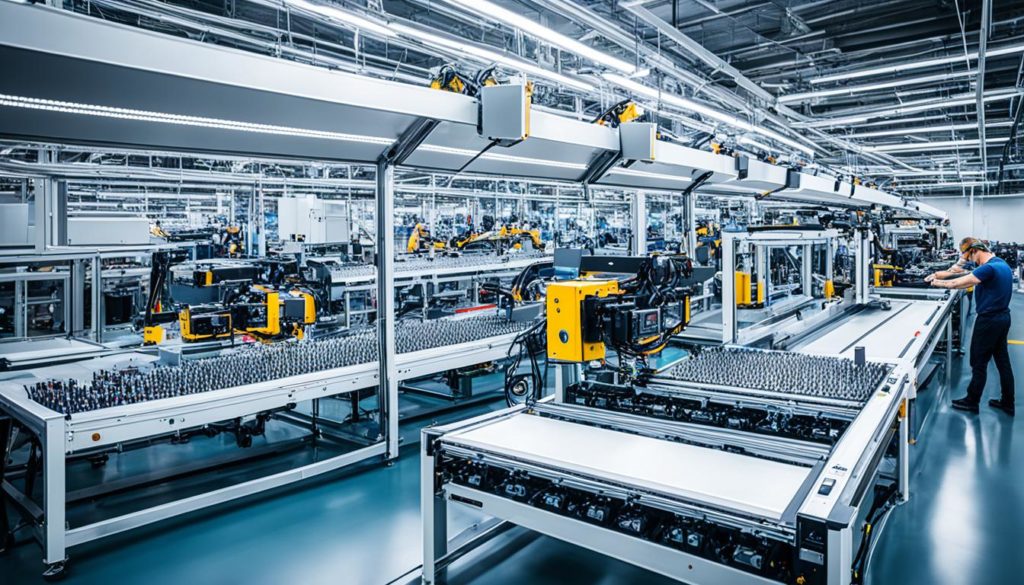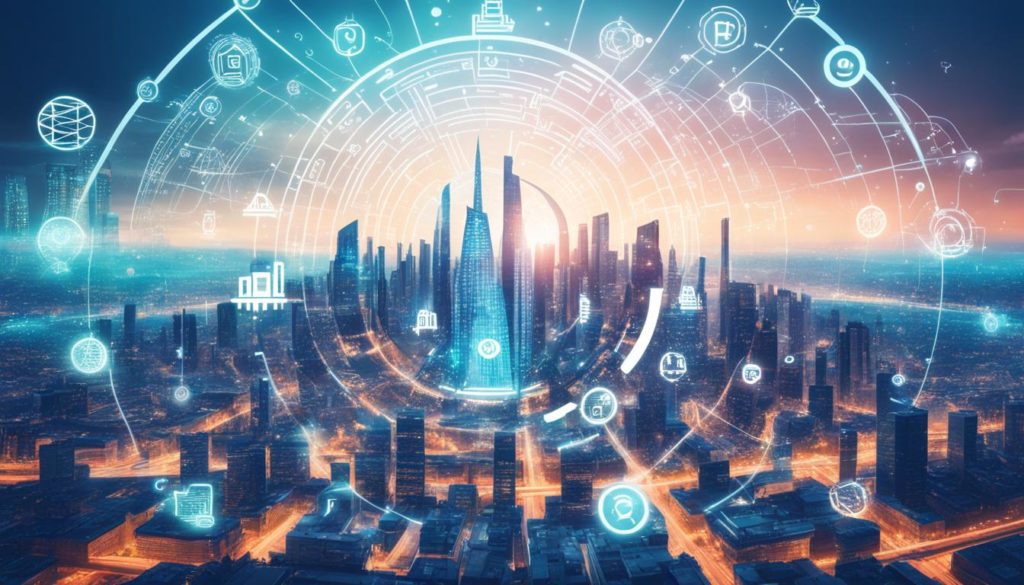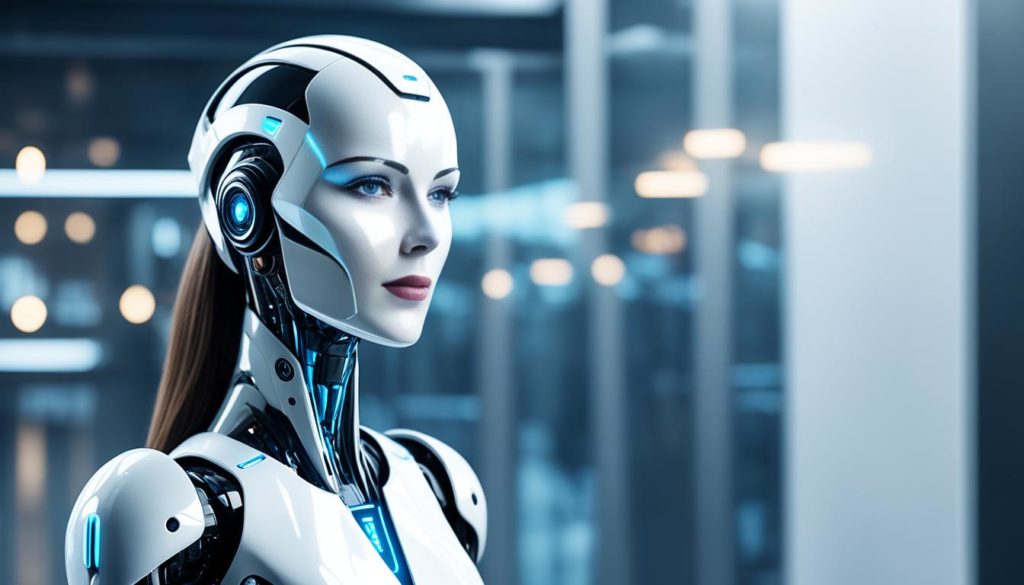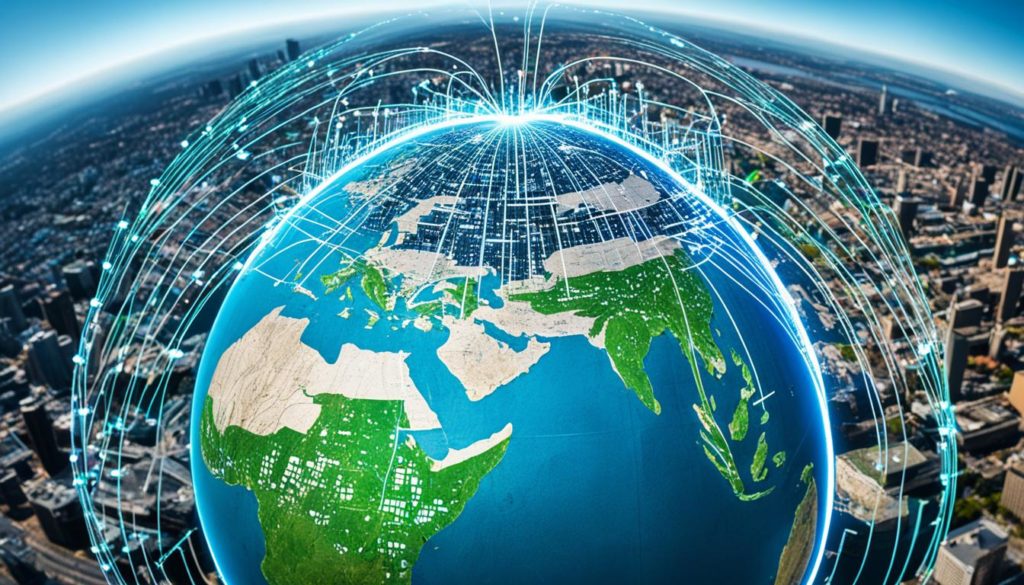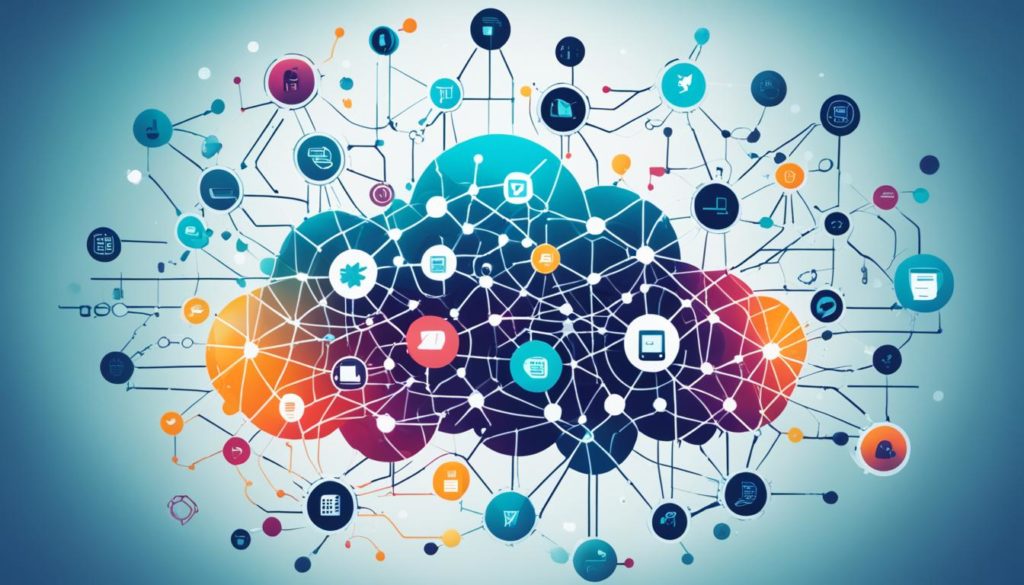
Step into a world where an impressive 55 percent of organizations have made artificial intelligence a part of their core operation. This big change is more than just about simple tasks; it is changing the way we live. With impacts in healthcare, business, and more, the future is becoming clearer, all thanks to AI integration in daily life.
We’re facing a crucial moment in technology’s path. AI’s advantages are not simple extras but key to growth and our daily life. Picture a place where almost one-third of tasks can be done through AI, releasing our creativity and innovation. Everything from how we work to how we interact is getting better, entering a phase where AI is enhancing quality of life like never before.
Key Takeaways
-
- A significant majority of enterprises have embraced or are considering AI’s transformative potential.
- Generative AI is becoming a cornerstone technology for an array of industries and professional workflows.
- AI’s impact extends to employees, automating parts of their jobs and necessitating new skills and training.
- The integration of AI in daily life promises to revolutionize our quality of life, but also poses challenges such as increased carbon emissions and potential job displacement.
- With the rapid evolution and adoption of AI tools, like ChatGpt in journalism, businesses and industries are on the brink of a new era of efficiency and innovation.
- New skills and competencies are required as we navigate this AI-driven world, highlighting a growing gap in AI proficiency.
The ethical dimension of AI deployment cannot be overlooked, as reflections of societal biases must be addressed.
The Evolution of AI From Origins to Current Day Innovations
AI technology has deeply changed our world from the start until now. Its growth shows how it’s molding our future and society.
The Beginnings: AI’s Journey from Checkers to Chess and Beyond
Artificial intelligence started taking shape back in 1951. It has grown a lot since then. In the 1960s, early programming languages like LISP came to be, thanks to people like John McCarthy. These early steps led to milestones, like IBM’s Deep Blue beating Garry Kasparov at chess and IBM Watson winning at Jeopardy!.
Generative AI: Expanding Horizons with GPT Models
OpenAI’s GPT-3, introduced in 2020, is a major AI step forward. With 175 billion parameters, it’s able to write text that seems very human. This breakthrough brings us closer to AI that thinks and communicates like us.
The Role of AI in Critical Advances: Vaccines to Speech Models
AI has greatly helped in medicine, making disease detection faster and vaccines quicker to develop. It’s also improved healthcare by managing big amounts of data efficiently. Plus, AI has made great strides in creating more natural speech. This is pushing tech to communicate with us better than ever.
The ongoing growth of AI is not only solving big problems but also promising a better future.
We’re just at the start of what AI can do. It will make big changes as it becomes more a part of our daily lives. To learn more about AI’s impact, check out this detailed exploration.
AI Impact Life in Business: Efficiency and Transformation
AI is changing how companies work. It’s not just a new trend; it’s a powerful force shaking up the way businesses operate and plan. With automation, businesses are seeing big leaps in how well they do things. AI is helping companies change how they work, leading to more growth.
Business Automation: Enhanced Operations and Customer Interactions
Automation is making companies work better every day. AI systems are now doing many tasks, from simple data entry to talking to customers. This is making things faster and more accurate. For example, chatbots are helping customers all day and night, answering questions without getting tired.
AI-Powered Decision-Making: Leveraging Data for Strategic Growth
AI is big when it comes to making decisions that can really shape a business. By looking at huge amounts of data, AI finds trends and insights people might miss. This lets company leaders make smart choices fast, steering the business towards more success. Predictive analytics by AI help businesses see future trends and get ready for them.
NVIDIA’s Perspective: AI as a Multipurpose Tool for Problem-Solving
NVIDIA sees AI as a key tool for solving tough issues in business. Their way mixes AI with special knowledge to spark new ways of doing things and solve problems better. Mike Mendelson from NVIDIA says this AI mix makes a work environment that’s always learning and changing, a big boost for businesses today.
Addressing the Societal Challenges: Data Privacy and Workforce Disruption
Using artificial intelligence (AI) has highlighted key social issues, such as workforce disruption and AI-generated data privacy concerns. To tackle these, we need to act smart and develop AI that is ethical. Solutions must protect the workforce and our private information.
Job Disruption and Upskilling: Navigating the Employment Landscape
AI is changing how we work, with more jobs at risk. This calls for a focus on AI and job upskilling. It’s about teaching new skills and using what makes us humans special.
Data Privacy Issues: Ethical Use of Consumer Information
Because of AI, concerns over our private data are growing. Companies are collecting lots of personal info for their AI. Using this data fairly is a top concern. We must make sure that privacy and clear data use rules are in place to protect people. To know more about these issues, check out addressing AI-related privacy risks and challenges.
| Impact | AI Advancements | Privacy and Ethical Concerns |
|---|---|---|
| Workforce Dynamics | Increased Automation | Risk of Job Displacement |
| Individual Privacy | Data-driven Decision Making | Potential for Bias and Discrimination |
| Data Security | Machine Learning Algorithms | Identity Theft and Cyberbullying Risks |
| Social Equity | AI in Governance and Public Sector | Amplification of Socioeconomic Disparities |
Integrating AI wisely is crucial for our future. We must reduce the impact on jobs with training and protect personal information. This is about more than just keeping up with tech. It’s about making sure technology helps us and our society in the right ways.
Regulatory Landscapes and Ethical AI: Framing the Future
The world is changing with artificial intelligence (AI) at its core. But as AI takes on more tasks and shapes choices, we urgently need to think about the responsible development of AI. Making sure AI is used ethically and fairly is vital for our society to trust it.
The rapid growth of AI is posing serious legal questions. It’s touching every part of our lives. This goes beyond just how we use AI. It’s also about issues like privacy, security, and AI and intellectual property. Some big court cases are showing us how to protect our rights while encouraging new ideas.
- The debate over AI’s role in content creation and the responsibility for its outputs suggests a need for clear intellectual property guidelines tailored for the digital age.
- Transparency in AI algorithms and the data sets used for training and decision-making represents another crucial area of ethical AI development.
- The balance between enhancing efficiency and safeguarding ethical interactions with users remains a key challenge for industry leaders.
When we develop AI, it’s crucial to remember ethical rules. These rules help make AI safe, open, and accountable. We want AI to respect human values and follow the law. So, the future of AI is all about creating smart and ethical systems.
Conclusion
The future of AI applications is making a big impact on our world today. It’s changing how we live in many positive ways. For instance, it’s helping in healthcare, making cars safer, improving finance, and making teaching better.
This shift to new AI technology isn’t without challenges. Some worry about losing jobs and ethics. But we’re working hard to handle these issues. We’re also making sure people understand how to use AI well.
So far, AI has already started helping us a lot. In healthcare, it’s improving how we diagnose and treat patients. Plus, AI in things like smartphones shows its many uses.
To grasp AI’s big changes, think about this breakdown:
| Aspect | Impact of AI |
|---|---|
| Healthcare | Improved diagnostic accuracy, personalized treatment plans. |
| Automotive | Enhanced safety with autonomous driving technologies. |
| Finance | Fraud detection, automated customer service, and financial advisory. |
| Education | Personalized learning experiences and automated administrative tasks. |
We’re all part of a future where working with AI brings great things. It’s key to use AI the right way, focusing on ethics and community well-being.
To learn more about AI’s role in different areas, check out detailed studies like NCBI’s investigation on public health AI impacts.
By using AI for good, we’re shaping a future where everyone benefits. Education and ethical use are vital. They help spread AI’s good effects everywhere, ushering in a new era of creativity and fairness.
AI Impact On Key Sectors: Expansive Reach and Future Projections
In healthcare, AI has made huge strides, improving how we care for people. Cutting-edge algorithms are helping doctors make quicker, more accurate diagnoses. They’re also simplifying how treatments are planned and making care more personal. This shift is making diagnoses faster and treatment plans more accurate.
AI is also changing the way we teach, creating a new model of education. It customizes lesson plans to match every student’s needs and pace. This means a future where every student gets a lesson plan designed just for them. It helps them learn better, preparing them for a world that values thinking and change.
In finance and the military, AI is changing the game. In finance, it’s shaking up how trades are made and risks are managed. It’s giving out insights that seemed impossible before. This means smarter, quicker decisions in a fast-moving market.
AI in the military is also a game-changer, providing new ways to keep us safe. But it also raises questions about using machines in war. In both fields, AI pushes us to balance progress with important human values.
FAQ
How is AI shaping our future?
AI is changing our future by becoming part of our daily lives. It makes everything from healthcare to education more efficient. This leads to a future where we can solve problems easier and simplify daily tasks.
What have been some major milestones in the evolution of AI?
In the 1950s, an AI started to play checkers. Later on, IBM Deep Blue won at chess. Then, IBM Watson became the champion at Jeopardy!.
OpenAI’s GPT models set the stage for AI to create content. In medicine, AI helps with vaccine development by analyzing RNA. These are major advances in AI history.
How does AI contribute to the advancement of critical technologies, such as vaccines and speech models?
AI speeds up vaccine development by analyzing RNA. This was key in fighting COVID-19. In speech models, AI helps create better systems for recognizing speech and making synthetic voices sound natural. These can help in tech and service jobs.
In what ways is AI transforming business operations?
AI is making business operations more efficient. It automates tasks and provides better data analysis. It also improves how companies interact with customers using chatbots. This leads to cost savings and better customer service.
What is the impact of AI on the job market, and how is it being addressed?
AI might take over some jobs, but it’s also creating new ones. It’s increasing the need for skills like machine learning. Companies and schools are helping workers learn new skills to keep up with AI.
How are data privacy concerns being managed in the era of AI?
Dealing with data privacy issues involves strict rules, more company openness, and public education. Laws like the GDPR aim to keep personal data safe. There are talks about giving AI a set of rights.
What are some of the legal and ethical considerations related to AI?
With AI, we worry about who’s responsible for its choices and if it’s fair. There are also concerns about how AI uses our data. People are working on rules to make sure AI is used the right way and fairly.
How does AI impact various sectors like healthcare, education, and finance?
In health, AI improves diagnostics and treatment planning. In education, it personalizes learning for students. In finance, it makes managing portfolios and stopping fraud better. AI is changing many fields for the better.
Future App Studios is an award-winning software development & outsourcing company. Our team of experts is ready to craft the solution your company needs.


